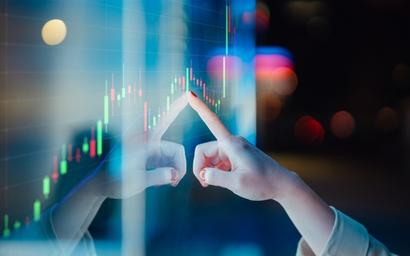 Global indices have been hit hard since the outbreak of Covid-19 wreaked havoc in markets worldwide.
Global indices have been hit hard since the outbreak of Covid-19 wreaked havoc in markets worldwide.
All MSCI indices were down by about 30% year-to-date towards the end of March as uncertainty continued and central banks and governments scrambled to mitigate the economic and social consequences.
In the words of Hortense Bioy, director of passive funds and sustainability research at Morningstar, “these are crazy times”.
It is a sentiment echoed across the asset management industry and beyond. Market volatility looks set to continue for the foreseeable future.
“When you’re invested in a market cap index fund or ETF, you feel the lows as well as the highs,” Bioy tells Funds Europe from her remote workstation. “With index funds, there is no protection,” she says.
Research by Lyxor Asset Management found that mutual funds and ETFs saw outflows across the board throughout the week ending March 20. A separate, timely report by Style Analytics claimed that active managers have outperformed passive strategies during market downturns over the past 25 years.
More than 1,000 actively managed US funds were analysed. Quality active managers not only beat passive investment during downturns, but their outperformance against the Russell 1000 index increased in relation to the scale of market losses.
“There are advantages to active funds during a downturn as they can keep some cash and, with that cash, when the markets go up again they can take advantage of that [and] buy companies where they see opportunities,” Bioy says.
According to Tatjana Puhan, managing director and deputy chief investment officer of ‘anti-benchmark’ manager Tobam, the current market environment “is one that calls for index fund investors to take caution”.
“In the equity space, the current market evolution exacerbates the massive bets that benchmark indices have built up over recent years, notably in the IT and communication services sector. Stocks in these sectors were much less sensitive to the sell-off and continued to increase their weights in the market indices because they were sold less,” she says.
And if passive investors are, therefore, buying baskets of highly sought-after stocks, they are taking a higher risk than they might realise.
© 2020 funds europe